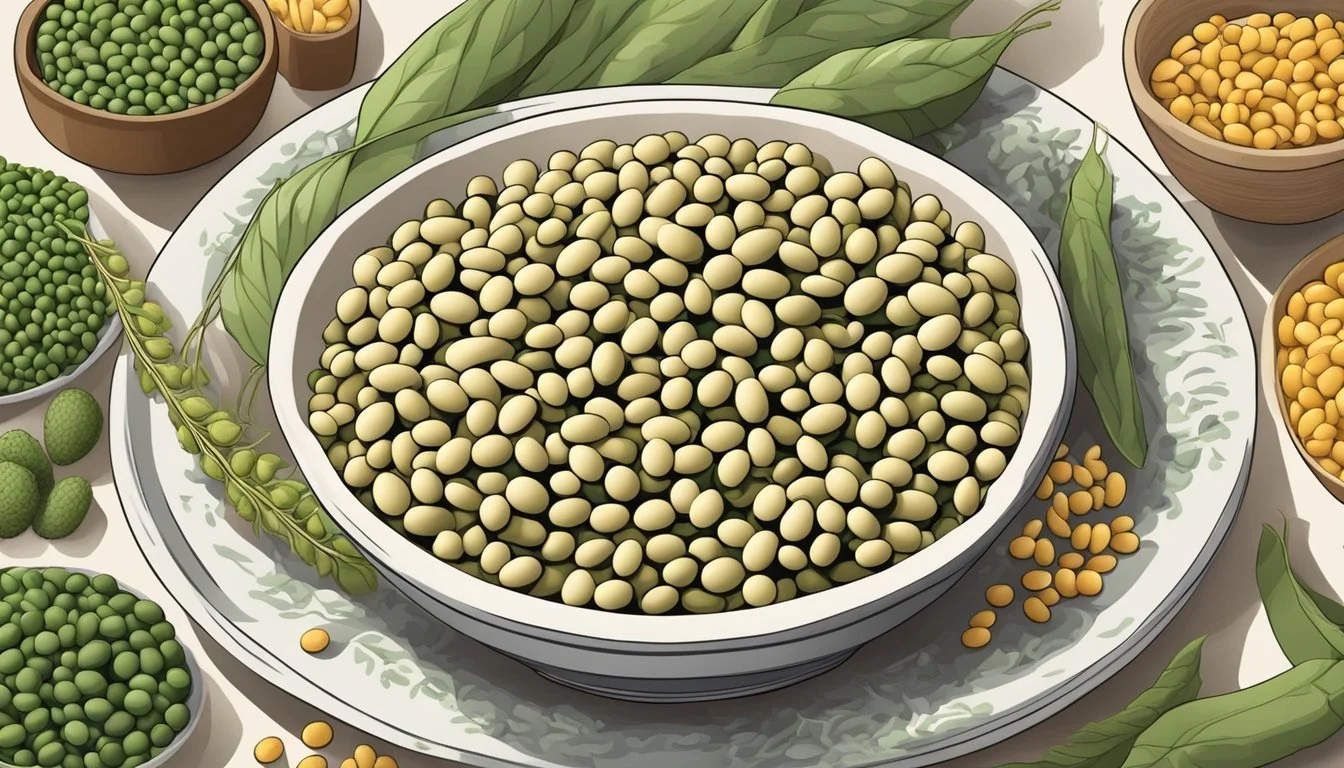8 Protein-Rich Foods High in Tryptophan
Boost Your Mood and Health
Tryptophan is an essential amino acid crucial for various bodily functions, including the production of proteins and the synthesis of serotonin, a neurotransmitter that regulates mood and sleep. As the body cannot produce tryptophan on its own, it must be obtained through diet, highlighting the importance of consuming foods high in this amino acid.
Incorporating tryptophan-rich foods into daily meals not only supports overall health but also improves sleep quality and mood regulation. Understanding which foods are rich in tryptophan can help individuals make informed dietary choices, supporting their nutritional needs and enhancing their well-being. This article will explore a variety of foods that are excellent sources of tryptophan, guiding readers towards better health and nutrition.
1) Turkey Breast
Turkey breast is a popular and rich source of tryptophan. This lean meat is favored for its high protein content and low-fat profile, making it a healthy choice for many diets.
A typical serving of turkey breast, around 3 ounces, provides significant amounts of tryptophan. This amino acid is crucial for producing serotonin, which regulates mood and sleep.
In addition to tryptophan, turkey breast contains essential vitamins and minerals, including B vitamins and selenium. These nutrients support overall health and well-being.
Incorporating turkey breast into meals can be done in various ways, such as roasting, grilling, or adding to salads and sandwiches. This versatility makes it easy to include in different dietary preferences.
2) Chicken Breast
Chicken breast is a popular and versatile food high in tryptophan. This essential amino acid plays a crucial role in the body’s synthesis of serotonin, which helps regulate mood and sleep.
A 3-ounce serving of chicken breast contains approximately 77 milligrams of tryptophan. Cooking methods like baking and grilling can ensure the preservation of its nutritional value.
Chicken breast is not only rich in tryptophan but also a great source of lean protein. It is low in fat, making it a healthy option for those seeking to maintain or lose weight.
Including chicken breast in meals can help meet the daily tryptophan requirements. This can aid in overall mental well-being and physical health.
Properly prepared, chicken breast can be a delicious addition to salads, sandwiches, or as a main dish.
3) Pumpkin seeds
Pumpkin seeds are a notable source of tryptophan, an essential amino acid. A one-ounce serving of these seeds provides 163-164 milligrams of tryptophan. Consuming tryptophan-rich foods like pumpkin seeds can assist in better sleep due to the amino acid's role in producing serotonin and melatonin.
In addition to tryptophan, pumpkin seeds are rich in other nutrients. They offer high-quality protein, comparable to soy, and contain beneficial fats including omega-3 and omega-6 fatty acids. These seeds are also packed with vitamins and minerals such as magnesium, copper, and zinc.
Pumpkin seeds can be integrated into various meals. They can be added to salads, smoothies, or eaten on their own as a snack. Their versatility makes them an easy addition to a balanced diet, contributing to both nutritional needs and improved sleep quality.
4) Soybeans
Soybeans are an excellent plant-based source of tryptophan. They are highly versatile and can be consumed in various forms such as tofu, tempeh, and edamame.
Edamame, in particular, stands out with a high tryptophan content. One cup of cooked edamame can provide a significant portion of the recommended dietary intake for this amino acid.
In addition to tryptophan, soybeans are rich in proteins, fiber, and essential vitamins and minerals like magnesium, copper, and vitamin K. These nutrients contribute to the overall nutritional profile of soybeans, making them a valuable addition to any diet.
Soybeans also contain antioxidants and anti-inflammatory properties, which can promote overall health. Their versatility in cooking allows for easy incorporation into a variety of dishes, from soups and salads to stir-fries and snacks.
5) Cheddar Cheese
Cheddar cheese is a dairy product known for its rich flavor and nutritional benefits. This cheese is notably high in tryptophan. A single ounce of cheddar cheese contains approximately 90 milligrams of this essential amino acid.
Tryptophan is important for the production of serotonin, which plays a key role in mood regulation and sleep quality. Including cheddar cheese in the diet can help boost tryptophan intake effectively.
Cheddar cheese is also a great source of calcium, which is crucial for bone health. It provides a good amount of protein as well, making it not only tasty but also nutritionally beneficial.
It's easy to incorporate cheddar cheese into various meals. It can be used in sandwiches, salads, or as a topping for dishes like baked potatoes and pasta. Additionally, it makes for a convenient and satisfying snack.
By including cheddar cheese in everyday meals, individuals can enjoy its flavor while also benefiting from its tryptophan content and other nutrients.
6) Eggs
Eggs are a versatile and nutritious food that contains high levels of tryptophan. One large egg provides approximately 77 mg of tryptophan, an important amino acid that the body uses to produce serotonin. This compound plays a crucial role in regulating mood and sleep.
Including eggs in the diet can help boost tryptophan intake. They can be prepared in various ways, such as scrambled, boiled, or poached, making them an easy addition to meals.
The protein in eggs not only supports muscle growth but also enhances tryptophan absorption. This makes eggs a particularly beneficial food for those looking to increase their tryptophan levels naturally.
Eggs are also rich in other essential nutrients like vitamins B2, B12, and D, choline, and selenium. These nutrients support overall health, further reinforcing eggs as a valuable part of a balanced diet.
7) Tofu
Tofu, a versatile and popular plant-based protein, ranks high among foods rich in tryptophan.
One serving of tofu can contribute significantly to your daily tryptophan intake. For instance, half a cup of firm tofu contains around 592 mg of tryptophan. This makes tofu an excellent choice for those seeking to increase their tryptophan levels.
Tofu also offers additional nutritional benefits. It's high in fiber, calcium, and B-vitamins, which contribute to overall health. Packed with around 43 grams of protein per cup, tofu is especially appealing to vegetarians and vegans.
Incorporating tofu into meals is simple. It can be added to stir-fries, soups, salads, or even grilled. Using tofu as a protein source may help diversify one's diet while boosting their tryptophan intake naturally.
8) Salmon
Salmon is a noteworthy source of tryptophan, an essential amino acid that the body uses to produce serotonin. This neurotransmitter plays a critical role in regulating mood and sleep.
A 6-ounce fillet of salmon contains approximately 570 mg of tryptophan, which is 203% of the recommended daily intake (RDI). This makes salmon one of the richest dietary sources of this amino acid.
Beyond its tryptophan content, salmon is also packed with high-quality protein and healthy fats, particularly omega-3 fatty acids. These nutrients contribute to various health benefits, including heart health and anti-inflammatory properties.
Wild-caught salmon is often preferred for its higher nutrient density and lower contaminants. Including salmon in the diet can be an effective way to boost tryptophan intake naturally, aiding in better sleep quality and overall wellness.
9) Tuna
Tuna is a well-known source of tryptophan, an essential amino acid that is crucial for various bodily functions.
A 3-ounce serving of canned tuna can provide up to 252 mg of tryptophan, making it a significant contributor to the recommended dietary intake.
This fish is also rich in proteins, omega-3 fatty acids, and essential vitamins like B12.
Tuna is often appreciated for its versatility in culinary applications. It can be added to salads, sandwiches, and casseroles, providing a nutrient-dense option for meals.
Its high tryptophan content aids in the production of serotonin, which can positively impact mood and sleep quality.
In addition to tryptophan, tuna contains other vital nutrients like vitamin D and selenium, which support overall health and well-being.
Whether fresh or canned, incorporating tuna into the diet can be a practical way to boost tryptophan intake.
10) Oats
Oats are a nutritious grain that are high in tryptophan, an essential amino acid. This makes them an excellent inclusion in diets aimed at enhancing serotonin production and improving sleep quality.
A typical serving size of oats, such as a cup of cooked oatmeal, provides a significant amount of tryptophan. This aids in promoting relaxation and a good night's sleep.
Additionally, oats offer other health benefits. They are a good source of fiber, particularly beta-glucan, which is known for supporting heart health and aiding digestive function.
Rich in vitamins and minerals like manganese, phosphorus, and magnesium, oats contribute to overall well-being. They are also a versatile ingredient, easily incorporated into various meals like breakfast bowls, snacks, and baked goods.
Regular consumption of oats can help maintain balanced blood sugar levels. Their low glycemic index supports longer-lasting energy and helps in managing appetite.
Benefits of Foods High in Tryptophan
Tryptophan-rich foods provide crucial benefits for mood regulation, sleep quality, and digestive health. These benefits stem from tryptophan's role as a precursor to serotonin and niacin, which are essential for various bodily functions.
Mood Regulation and Mental Health
Tryptophan helps in the production of serotonin, a neurotransmitter that significantly impacts mood stabilization.
High-serotonin levels are associated with improved mood and lower rates of depression and anxiety. Consuming tryptophan through foods like turkey, chicken, and nuts can boost serotonin production naturally.
Consistent intake can help maintain mental health, providing a buffer against stress and emotional disturbances.
Incorporating foods high in tryptophan can be a simple nutritional strategy to support overall well-being.
Sleep Improvement
Tryptophan aids in the production of melatonin, a hormone that regulates sleep-wake cycles.
Foods such as milk, nuts, and bananas can be beneficial for those struggling with sleep disorders or poor sleep quality.
Increasing tryptophan intake may improve sleep latency and duration, making it easier to fall and stay asleep. This is especially beneficial for those with insomnia or other sleep disturbances.
Support for Digestive Health
Tryptophan also aids in producing niacin, which is vital for digestive health.
Niacin helps maintain the mucous membranes and supports digestive enzyme production. Foods like tofu, beans, and seeds, which are high in tryptophan, can contribute to better digestive function.
By ensuring adequate intake of tryptophan, individuals can support their gastrointestinal health, reducing the likelihood of issues such as indigestion and inflammation.
How Tryptophan Converts to Serotonin
Tryptophan is an essential amino acid involved in the synthesis of serotonin. This conversion process engages several biochemical steps and requires specific cofactors such as vitamin B6.
Biochemical Pathways
Tryptophan's conversion to serotonin begins when tryptophan hydroxylase catalyzes the transformation of tryptophan into 5-hydroxytryptophan (5-HTP). This is the rate-limiting step and primarily occurs in the gastrointestinal tract.
Next, 5-HTP undergoes decarboxylation by aromatic L-amino acid decarboxylase to produce serotonin (5-hydroxytryptamine or 5-HT).
Serotonin synthesis is crucial in both the central nervous system, where it influences mood and cognition, and the periphery, where it impacts gastrointestinal function.
Role of Vitamin B6 and Other Cofactors
Vitamin B6, in the form of pyridoxal phosphate, acts as a cofactor required for the enzyme aromatic L-amino acid decarboxylase, which converts 5-HTP to serotonin.
Other essential cofactors include iron, which aids in tryptophan hydroxylase activity, and tetrahydrobiopterin (BH4), which also supports the initial hydroxylation of tryptophan.
A deficiency in any of these cofactors can lead to reduced serotonin synthesis, highlighting their importance in maintaining optimal serotonin levels.
Dietary Considerations
When incorporating tryptophan-rich foods into a diet, balancing with other nutrients and understanding potential risks are key for optimal health outcomes.
Balancing Tryptophan with Other Nutrients
Balancing tryptophan with other nutrients is essential for holistic health. Foods high in tryptophan often also provide protein, vitamins, and minerals. For instance, tofu and legumes offer not only tryptophan but also protein, fiber, and essential vitamins like vitamin K and B vitamins.
A varied diet helps meet daily nutritional needs. Combining tryptophan sources with complex carbohydrates, like whole grains or vegetables, may enhance serotonin production. A balanced diet requires attention to both macronutrients and micronutrients, ensuring the body receives adequate energy, vitamins, and minerals.
Potential Dietary Risks and Side Effects
Potential dietary risks and side effects associated with high tryptophan intake should not be disregarded. Consumption of large amounts of tryptophan-rich supplements can lead to an imbalance and potential side effects like nausea or gastrointestinal distress. Eating a varied diet with natural sources of tryptophan reduces these risks.
Individuals with pre-existing health conditions should consult healthcare providers before dramatically changing their diet. Tryptophan levels from food sources like turkey, chicken, and tuna are generally safe, but awareness of portion size and dietary balance remains important. Healthy dietary practices help mitigate risks and support overall well-being.










